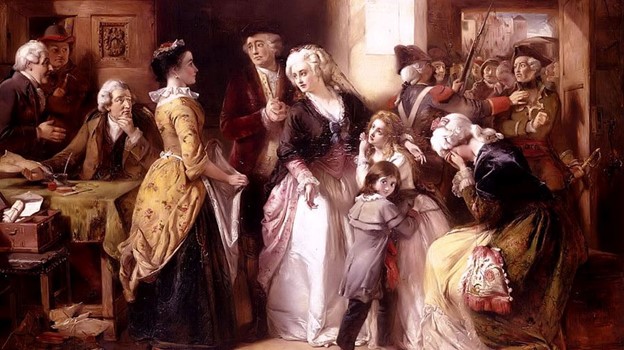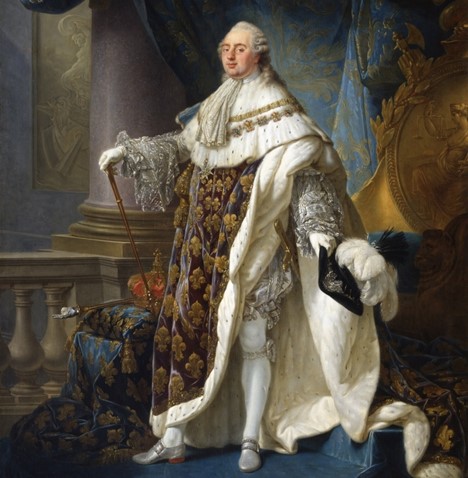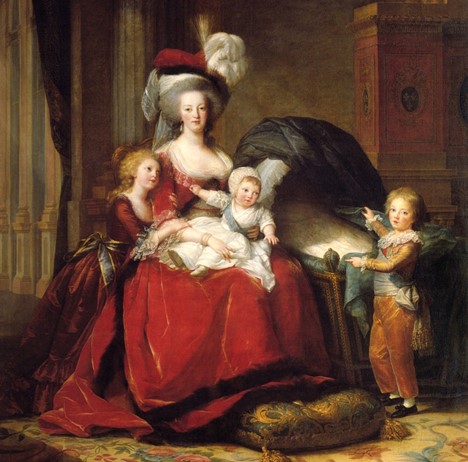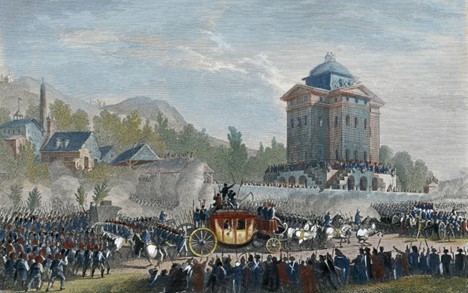
The arrest of Louis XVI: Varennes, end of journey
The arrest of Louis XVI: Varennes, end of journey
The king’s escape was the culmination of royalty, which, as Alexandre Dumas says, took „seven hundred and four years to climb to Varennes and only nineteen months to descend from Varennes to the Revolution Square.” The three years between the French Revolution and the time of the escape meant for Louis XVI a real descent into hell.
Preparations for escape
However, there was an opportunity that Ludovic didn’t know how to exploit in his favor. On July 14, 1790, when Paris decided to celebrate National Unity through a grand ceremony on Champs de Mars / “Field of Mars”, the king was closer than ever to the people. He swore he would accept the Civil Constitution of the Clergy, adopted two days before:
„I, King of the French, swear to employ the power delegated to me by the constitutional act of the state, to maintain the Constitution decreed by the National Assembly and accepted by me.”
On that day, the people, in turn, felt, more than ever, close to the sovereign and the new regime. Later, when the Varennes episode was already over, Barnave, one of the key characters in this episode, declared: “If the king knew how to take advantage, we would have been lost.” („We should have been lost, had you known how to profit by it.”)
The alliance between the king and the people ends on June 21, 1791, in a small town in Lorraine. As an irony of fate, Varennes en-Argonne was not far from Reims, the city where Coronation of the Kings of France took place starting with the 13th century.
The night of June 21/22, 1791 was thus to become one of the decisive nights in the history of France. If the patrol, which was a few leagues away from Varennes, would have dared to force the dam built there, the monarchy would have been saved. But fate decided otherwise.
Louis XVI and Marie Antoinette simply felt unable to cope with the political events around them. The thing that worried them most was the time when the king had to ratify the Constitution, against which they had objections of principle.
Louis XVI
At the same time, the population was becoming increasingly threatening, and on the terrace in front of the Tuileries Palace, obscene demonstrations and songs had stopped. Following the events of October, the palace’s interior service had been entrusted to the National Guard, whose permanent presence always reminded them of their true status as prisoners.
Refugee in Switzerland following the events of July 1789, the Baron of Breteuil, their former minister, constantly asked the king to leave Paris and settle in a fortified city, from where, with the help of Austrian troops, as well as local regiments, he would be able to restore his authority. But there was an event that made the king think very seriously about an escape.
On April 18, 1791, on Easter Monday, the king wanted to go to Saint-Cloud with his family to receive the communion from a “refractory” priest. However, the National Guard closed the palace gates. During this time, the bells of the Church of Saint-Roch began to ring. The crowd gathered in front of the gates. The rumor had spread that Louis XVI wanted to flee. Thousands of voices began to shout:
„- No! no! no! The king wants to flee!”
„-But I love you too much to leave you, my children!”, the king cried.
„- And we love you!”, said a grenadier, „but only you!”.
La Fayette, Commander of the Paris National Guard, tried to restore order, but in vain. He advised the king and the queen to return to their apartments.
“You must admit now that we are no longer free”, yelled the queen, stepping out of the carriage. Indeed, the king was no longer free, but a captive had the right to escape, says Alexandre Dumas. The most able to support and cover the escape plans of the royal family seemed to be François Claude Amour du Chariol, marquis de Bouillé.
Bouillé, general commander of the army in northeastern France, was hated by revolutionaries. He was very serious about emigrating, but received the first calls from the king and queen in December 1790. Then there were the count of Mercey-Argenteau, as well as count Axel Fersen, very devoted to the queen.
„The event that just occurred (Monday, April 18)”, writes Marie-Antoinette to Count Mercy-Argenteau, “confirms the justice of our projects (…) Our life itself is no longer safe.”
A few days later, on May 6, she adds:
„Our position is horrible (…) we have no alternative but to do blindly all that the rebels demand, or else to perih under the sword which is perpetually suspended over our heads.”
At the end of January, the king sets out with the Marquis de Bouillé to retire to Montmédy. Two roads led to Montmédy – one via Reims and Stenay, the other one via Châlons, Sainte-Ménehould and Verdun.
The first road had the advantage of not crossing (except for Reims), large cities, where the king could be recognized. The second road passed through Verdun, an extremely revolutionary city. However, there was a road via Varennes, but there were no post-horses. However, the king chooses the road via Varennes.
Marie Antoinette and three of her children
By the end of April, he writes to Marquis de Bouillé that he will leave with his entire family in a single berline carriage. But Bouillé considered it was more prudent for the royal family to leave with two English diligences, very common at that time. As the Queen didn’t agree to travel separately, the berline left Paris on June 19.
Count Fersen was responsible for its construction and arrangement, while the Marquis de Bouillé was to provide the post horses between Châlons and Montmédy. The companies of the Duke of Choiseul and of the Count of Damas were to wait for the arrival of the berline in different villages. Count Hans Axel Fersen had carefully prepared for escape of the royal family. The plan had been well-established since May 29; the royal family was heading to Metz, but not before meeting, at Montmédy, the Marquis de Bouillé, co-organizer of the plan.
The plan, however, had a 24-hour delay because, if Dumas was right, the king had to lift his quarterly rights, according to the Civil List.
A malefic itinerary
On Monday, June 20, 1791, both the king and queen had a perfectly normal behavior; no one suspected that the big day had come. At six o’clock in the evening Count Fersen appeared, who had come to inform them that he had prepared a berline for six persons. At ten o’clock in the evening, the Dauphin is awakened by Madame de Neuville, one of the maids.
Marie-Antoinette was also there. The Queen told the Dauphin that they were leaving for a „battlefield, where there will be many soldiers”. Nervy, Louis-Charles immediately asked for his boots and sword: „Quick! Quick! Hurry! Let’s go!”.
To his great disappointment, he must wear a dress. His sister, Marie-Thérèse, asks him what he thinks about this:
“I think we’re going to play a comedy, because we’re disguised.”
At 9:45 pm, Count Axel de Fersen leaves the berline at the Saint-Martin barrier, just at the entrance to the road leading to Metz. At the same time, 180 dragons (soldiers), sent by the Marquis de Bouillé, arrive at Clermont-en Argonne, while another 40 Hussars are stationed at Sainte-Ménehould. Their role is to keep the road under observation and then, once the royal vehicle arrives, their task was to escort it to Montmédy or, eventually, to Belgium, part of the Austrian empire at that time.
At 10:30 pm, two of Marie-Antoinette’s maids, Madame Brunier and Madame Neuville, leave Tuileries to go to Claye-Souilly, where they will wait for the berline. At about midnight, the king leaves Tuileries disguised as a valet. He gets into a “citadine”, an ordinary city vehicle parked near the Tuileries; half an hour later, he meets his sister and Marie-Antoinette.
Unfortunately, the royal family has to wait for the berline, as there had been an hour and a half delay. Everyone got into the heavy vehicle, leaving Paris without an escort.
Fersen accompanies them to Bondy, then returns to Paris. In the berline there were the king, Marie Antoinette, the Marquise Louise-Elisabeth de Croy de Tourzel, the children’s governess, Louis-Charles, the little duke of Normandy, the heir to the throne and his sister, Marie-Thérèse. The Marquis de Tourzel has a fake passport, assuming the name of Madame de Korff, a Russian baroness. Marie Antoinette assumed the name of Madame Rochet, the companion of the baroness and the French governess of the two “little girls” of the “Baroness” Korf.
As for the king, he passed himself off as M.Durand, the Baroness de Korff’s steward. At Bondy, the two maids of the queen, Madame Brunier and Madame Neuville, also join the berline. Fersen said goodbye to the royal family, and kissed the king’s hand first, so he could also kiss the queen’s. He returns to Paris, where he will leave for Brussels.
The king and the queen are quite excited. They are relieved that they are far from Paris and they are saved. Even a two-hour delay in Montmirail doesn’t make them rush. At the inn in Chaintrix, five leagues away from Chalons-sur Marne, François Picard, the son of the post station, recognizes Louis XVI, but does not say a word.
Berlin reaches Chalons-sur Marne, just when the cathedral bell announces four-thirty. People look curiously at the carriage of the royal family.
„We were unquestionably recognized there”, Marie-Thérèse, also known as Madame Royale, wrote later.
The berline carriage leaves the city without haste, at four-thirty. There are only four leagues to Pont De-Somme-Vesle where, according to the plan, the young duke of de Choiseul must wait for them with his forty dragons. An hour’s drive if they hurry.
But at Pont-de-Somme-Vesle there was no one. The officers who had to wait for the king’s arrival here to escort him to Montmédy had already left, since it was assumed that the escape plot had failed.
At about seven-thirty, while the berline was on its ay to Ferté-sous-Jouarre, as the berlin was making its way through La Ferte-sous-Jouarre, in Paris it was noticed that the King had vanished. Everyone is disoriented. The King’s departure had been talked about for so long that no one now believed it would really happen.
La Fayette sends couriers in all directions, for the king to be stopped as soon as possible. The order is terrible:
„From the National Assembly, every good citizen must stop a berline drawn by six horses, suspected to contain the King and the Queen!”
In the evening, the large green carriage with yellow wheels reaches Sainte-Ménehould. In the small town of Champagne, the presence of a very large berline, intrigued the inhabitants. The head of the post office, a certain Drouet, who lived in Versailles, seems to recognize the king, but to be sure, he looks at a bank note, an assignee, appeared not long ago, on which was the portrait of Ludovic.
He does not react immediately, but changes horses and lets the carriage leave. Learning from the couriers of La Fayette that the king is a fugitive, Drouet is instructed by the City Council to proceed as soon as possible to Varennes, the next stage of the trip. He arrives at Varennes at 11 o’clock in the evening, before the arrival of the berline. When the berline was already at the entrance of the city, he alerted residents by ringing bells:
„Here comes the King! He must be stopped!”
Longest night
The berlin set off, but as it entered a vaulted passage, some men suddenly appeared out of the darkness, menacing and waving their guns threateningly. The Berlin is stopped by Sauce, the representative of the municipality in Varennes. Sauce opened the door of the berline and asked for passports. Everything seems in order and Sauce is ready to let the carriage continue on is way.
But Drouet was sure that the carriage contains the king and the queen, who must be stopped. An increasingly large crowd gathered around the coach. Sauce is astonished: Is this the king? Is it possible for a king to flee the capital like a thief?
He didn’t know what to do, so he invited the royal family into his grocery store as he went to find a townsman who had lived at Versailles. While Louis, Marie-Antoinette, Elisabeth and Madame de Tourzel remained on the ground floor, and the two children were put in bed with the Sauce children.
Sauce arrives quickly with Destez and pushes him into the room. Destez bowed before Louis XVI only saying: „Oh, Sire!”. The king ceases to play the role of the valet and embraces him, then he recognizes:
„Yes, I am your king.”
The members of the Municipal council are amazed and excited at the same time. Sauce looked at the fugitives with astonishment. The letter he sends to Strasbourg the following day is a proof of his ingenuity:
„The king embraced me and clutched me, saying: Yes, I leave the Assembly, my dear friend, to live in your midst.”
Louis then gives a short speech, reiterating that his destination was Sainte-Ménehould, that he had left Paris because the lives of his family were being threatened every day. He repeated that he wants to continue his route, even with an escort.
Although the speech was touching, the Varennois were not prepared to let the King go. The time seems to have stopped that night and the candles cast fantastic shadows on the faces of those who involuntarily became heroes. It is almost 1 a.m and suddenly someone shouted:
„The hussars!”
These were indeed Choiseul’s hussars. He stormed into the Sauce home with some of his men, the Colonel of Damas and Mr. de Gougelat, the geographical engineer. The king became hopeful again and asks the latter:
“Well, Gougelat, when are we leaving?”
The tho men suggested the king to continue his journey on horseback, using the the horses taken from the Hussars, instead of keep using the berline. When Louis asked if he would not be putting his family to danger, the Colonel replied that he would kill himself immediately if any misfortune occurred. This made the King reject the offer. He did not want his family to run any risk. Plus, he still hoped that Bouille would arrive to help.
„There is no longer a King in France”
At six o’clock, two of the messengers of La Fayettefrom rode into Varennes, armed with a decree asking „good citizens to bring the king back to the National Assembly.”
Bayon, one of the messengers, in a distressed tone, tells the king: “Sire, there will be blood in Paris if the king doesn’t return!”. Outside, the crowd was agitated. When the order is brought to his attention, Louis can only whisper, „There is no longer a king in France.”
He laid the fatal document on the bed where his children, Marie-Thérèse and Louis-Charles, slept. The Queen snatched it and threw it on the floor. „I will not have my children defiled by it”. Convinced that eventually Bouillé will arrive with his troops here, Ludovic is trying to save time, invoking the fatigue of the queen and the children.
However, the representatives of the municipality are not convinced; therefore, at about seven in the morning, the two children are awake. Departure to Paris is inevitable.
Inhabitants of neighboring villages arrived armed with sickles, rifles and sticks. The mob began to shout, „To Paris, to Paris!”
As the suite heads to the berline which the people had moved to the front of the store, there were a few faint cries of, “Long live the King,” that were drowned out by, “Long live the nation.”
Exhaused and escorted by a large crowd, the carriage drove away in a thick cloud of dust. Between the hopeful departure, from the evening of June 20 from Paris and the desperate departure from Varennes, on the morning of June 22, thus in an interval of only thirty-six hours, history holds its breath, before diving into a hazard, which we could call fatality. If no one had spoken of Varennes before June 21, 1791, on June 22, the entire Europe had the eyes fixed on this locality, which had known 12 hours of feverish life.
Stations of the Cross
The return trip was a nightmare; and the nightmare lasted four days. In oppressive heat, the cortege continued its slow journey in the midst of revolutionaries and peasants, whom they meet throughout. The closer they got to Paris, the greater the hostility of the people. Some try to hang on doors, asking the Dauphin to shout: “Long live the nation!” The queen introduces them the heir, but the mob began to shout:
„You can show us your son as much as you want, we know it’s not Louis’s.”
Other people are more angry, spit in their direction or just shout that they will snatch their heart and liver, which they will fry and eat… The courthouse stops for a night at a modest inn. Frightened by the events, Louis-Charles dreams of wandering in the woods. Wolves, tigers and other creepy animals want to devour the queen. He wakes up crying and won’t calm down until he feels his mother’s embrace.
The next day, the nightmare begins again. In the meantime, the National Assembly sends three deputies to accompany Louis to Paris. Pétion, Latour-Maubourg și Barnave met the cortege on June 23, towards evening. Barnave climbed in the berlin and put the dolphin on his lap:
„You’re not upset about going back to Paris, are you?” “Oh, the child replied, I am fine everywhere. Especially when I’m with my father and my mother, the queen… and with my aunt, my sister and Madame de Tourzel.”
Immersed in memories, the king remembers the happy trip to Normandy. „Don’t be sad, father, we’ll go to Cherbourg another time”, Louis-Charles said.
No gesture, no shouting
On June 25, the cortege enters Paris through the Neuilly barrier, after which it crosses the city in an almost mournful silence. „Whoever applauds the King will be flogged, whoever insults him will be hanged”, could be read on the walls in the capital. The National Guard stood at attention controlling a huge, silent crowd, presenting their weapons as for a funeral, with the rifle bed up. The King and Queen looked as though they were going to their execution. The king’s fate is now sealed.
The return of the royal family to Paris (June 25, 1791)
According to Dumas, the event occurred in Varennes was the most important moment of the French Revolution and even of the history of France. The arrest of the king in this locality, he says, is the source of all the political events that were to happen. If the king would’t have attempted to flee or if his plan would have succeeded, other events would have replaced those present and there would have been no civil war, coalition, terror, Napoleon, Austerlitz, Elba, Waterloo or Saint Helena. Joseph de Maistre summarizes this situation with an amazing phrase:
„Varennes was for the king the first step towards the gallows.”




Leave a Comment